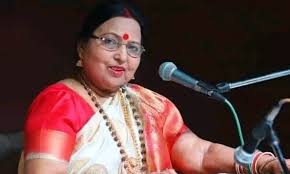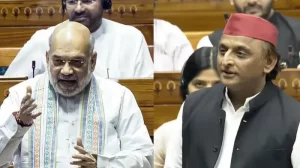
Renowned folk singer Sharda Sinha, a Padma Bhushan awardee recognized for her significant cultural contributions and powerful voice, has passed away at the age of 72. She was receiving treatment at AIIMS Hospital in Delhi, where she spent her final days struggling with health complications.
Her son, Anshuman Sinha, announced her passing on the social media platform X, expressing deep gratitude for the love and prayers received for his mother. He stated, “Chhathi Maiya has called mother to her. Mother is no longer with us in physical form.”
This loss comes shortly after the death of her husband, Brij Kishore Sinha, who passed away just a month and a half ago on September 22 due to a brain hemorrhage. Those close to Sharda Sinha mentioned that she had been in deep grief since her husband’s passing, and her son had recently shared updates on her declining health on his YouTube channel.
Addressing her millions of fans, Anshuman shared that his mother had been put on a ventilator and that her condition had worsened significantly. “This time it is very difficult,” he had said, asking fans to pray for her strength. Sharda Sinha had been battling multiple myeloma, a form of blood cancer, since 2018. This condition, which causes the plasma cells in the bone marrow to grow uncontrollably, had led to tumors in her bones over time.
Sharda Sinha’s journey in music is one of both talent and cultural influence. She was best known for her contribution to North Indian folk music, especially songs that resonate deeply in Bihar and the Purvanchal region during the annual Chhath festival.
Her rich voice became synonymous with the sounds of rural Bihar, echoing in almost every household during this festival. Sinha’s music was a bridge between tradition and the hearts of millions, bringing the essence of Bihar’s folk heritage to both rural and urban audiences.
Her singing career began in the 1970s, with songs in Bhojpuri, Maithili, and Hindi that portrayed the struggles of migration and women’s experiences. Her work addressed social themes, particularly the challenges faced by women in Bihar. These themes resonated widely with listeners.
One of her most iconic songs, “Babul,” featured in the popular Bollywood film Hum Aapke Hain Kaun, continues to be a poignant farewell song for daughters in Indian weddings.
Sharda Sinha was awarded the Padma Bhushan, India’s third-highest civilian award, in 2018, in recognition of her unique contributions to Indian music and culture. Her songs became embedded in rituals and ceremonies across life events and festivals, from celebrations to moments of mourning. Whether it was the birth of a child, the festival of Chhath, or the transition of seasons, Sinha’s voice was a part of the cultural soundtrack of Bihar.
Born in 1953 in the small village of Hulas in Supaul, Bihar, Sharda Sinha grew up in a family without a background in music. Her father, however, recognized her talent early on and encouraged her passion for singing. A government officer in the education department, he provided support to nurture her musical abilities, sensing that she had a rare gift.
Sharda explored various genres within light music—bhajans, ghazals, and folk songs—but her heart was set on folk music. She found folk music uniquely challenging and began experimenting with it, ultimately shaping a career around this powerful yet often overlooked genre.
After her marriage, she continued singing with the support of her husband and mother-in-law, embracing and performing the songs in a style deeply rooted in rural traditions. Unlike many artists who may feel pressured to adopt modern styles, Sharda stayed true to her folk roots, which gave her music a timeless, authentic quality. Her voice, characterized by its depth and emotive strength, remained unchanged over the decades, contributing to her enduring appeal.
Sharda Sinha’s influence on folk music is unparalleled, and despite the emergence of many talented folk singers, few have achieved the level of acclaim and recognition she enjoyed. Her voice, uniquely soulful and instantly recognizable, became a hallmark of North Indian folk music.
Her music did not just entertain—it educated, evoked pride, and preserved the cultural heritage of Bihar and neighboring regions. Even today, her songs continue to resonate, offering a sense of connection to the traditions she represented so passionately.
With Sharda Sinha’s passing, India has lost not only a gifted artist but a cultural ambassador who embodied the spirit of her homeland through music. Her legacy lives on in her songs, which will continue to be an integral part of festivals, family gatherings, and personal memories for generations to come.







